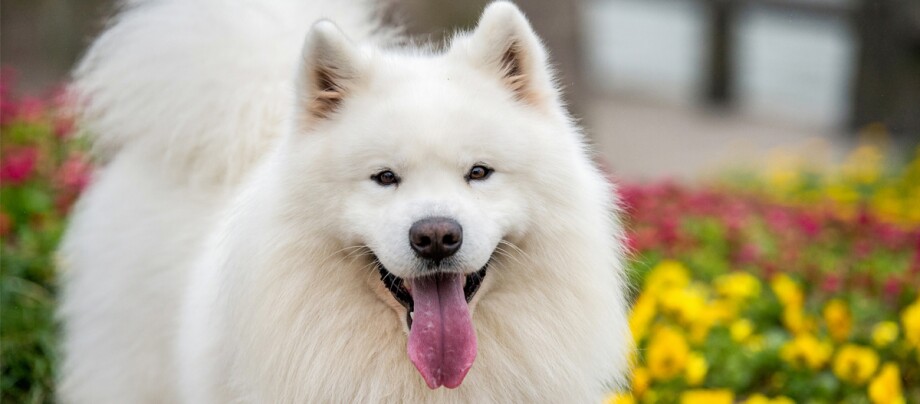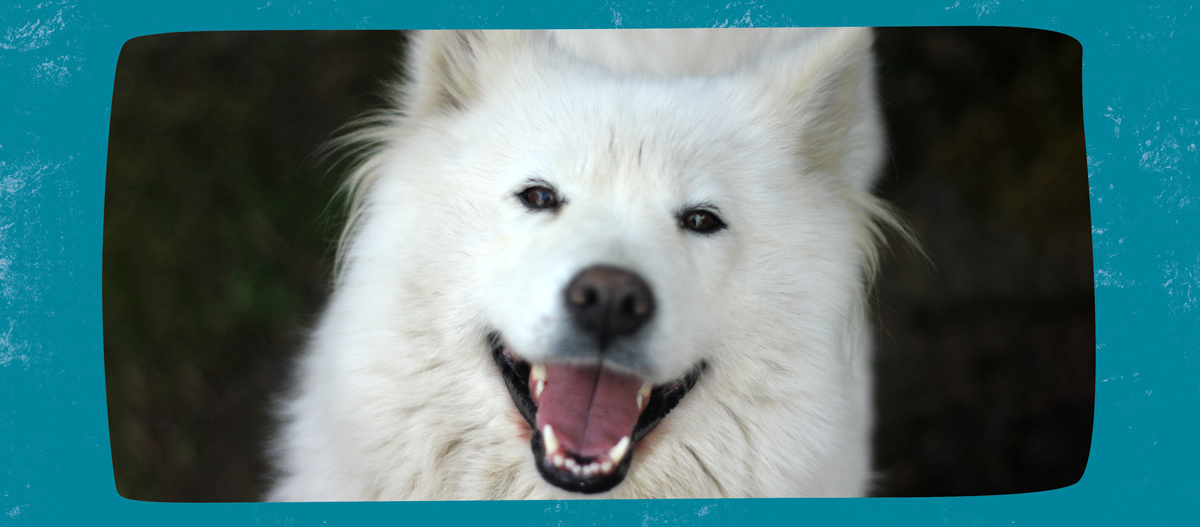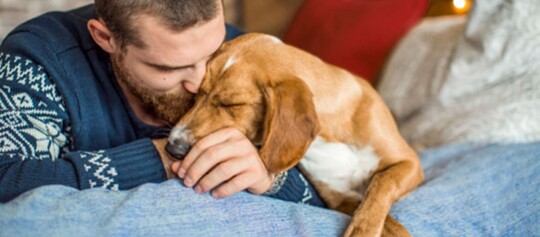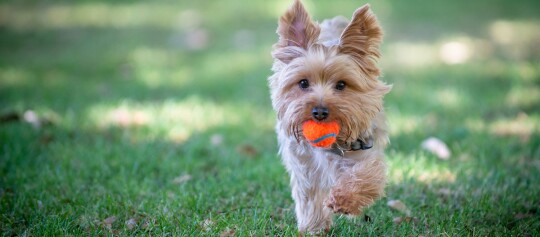Samoyed – the great canine soul from the wide expanses of Siberia
22.02.2024 - Reading time: 9 minutes

The Samoyed is loved around the world for its characteristic ‘smile’. Once used as a working dog and fluffy source of warmth by the nomadic Samoyed people of Siberia, this four-legged friend is now a valued family companion. This sociable dog with a magnificent, light-coloured coat keeps its owners on the go with its active nature and stamina.
- Sled dog with stamina and fluffy bed warmer
- Character and temperament: Does a Samoyed make a good family dog?
- Profile
- Is a Samoyed hard to train?
- How to keep your Samoyed properly occupied
- Is a Samoyed suitable for first-time owners?
- How much does a Samoyed cost?
- Buying a Samoyed – what to consider
- What does a Samoyed look like and what special characteristics does it have?
- What diseases are Samoyeds predisposed to?
- Fun fact: Samoyeds are known for their characteristic smile
Sled dog with stamina and fluffy bed warmer
Pulling sleds, herding reindeer and keeping watch: a Samoyed living hundreds of years ago in Russian Siberia would have had a number of different roles. But for the nomadic Nenet or Samoyed tribes, the dogs were much more than mere working animals: They slept in the tents with their owners, keeping them warm through the cold winter nights with their soft fur and providing the children with comfort and security. In the 19th and 20th centuries, they were used by explorers as sled dogs for expeditions in the Arctic and Antarctic on account of their stamina.
Character and temperament: Does a Samoyed make a good family dog?
Being a sled dog, the Samoyed is particularly sociable and active. It needs to feel like part of the pack, meaning that it also makes an ideal family dog. It is also approachable and good with children. The breed is known just as much for its gentleness and calm aura as it is for its affectionate nature. It shows no signs of aggression. The Samoyed is also said to be intelligent and outgoing. Thanks to its approachable nature, it makes an outstanding therapy dog or visiting dog. However, the Samoyed is less suited to being a guard dog – it simply looks too friendly for this and behaves in this way with almost everyone. Dogs of this breed can have a tendency to bark, so the Samoyed may at least alert you to someone’s presence. How suitable a Samoyed is as a family dog depends not only on the dog’s characteristics, but also on whether its needs are being met by its owners. Family life should therefore involve the dog and it is crucial to ensure that you will have enough time and space for exercise and activities.
NewsletterSamoyed
Breed | Samoyed |
Origin | Russia |
Classification | Spitz and primitive types; Section 1: Nordic sled dogs |
Size | 53 to 57 centimetres |
Weight | 20 to 30 kilograms
|
Physique | powerful and muscular; high-set tail that is often carried to the side or bent over the back |
Eyes | medium brown to dark brown; blue eyes not permitted according to breed standard |
Ears | small, wide-set, upright ears with slightly rounded tips |
Coat and colour | very thick and lush, thanks to the long outer coat and soft undercoat; pure white, bisquit and cream are possible colourations |
Special features | typical “smile”, resulting from the position of the eyes and the slightly upturned angle of the flews |
Nature | sociable, friendly, self-confident, very active |
Care | brush with a standard commercial dog brush; a little more frequently when shedding |
Health | regular check-ups including eye, heart and hip examinations help your Samoyed to stay fit as they get older |
We have the best products for your Samoyed!
Is a Samoyed hard to train?
As a general rule, Samoyeds are not hard to train. But as with any dog, it is important to adopt a consistent and – from the dog’s perspective – meaningful training style. The Samoyed’s breed-specific needs must be met if it is to grow into a happy, well-rounded dog.
To be more specific, this means that a Samoyed dog needs both mental and physical exercise. This includes ample daily exercise no matter what the weather and intensive activity. For this reason, the people best suited to owning one of these robust and outgoing four-legged friends are those with an active lifestyle. The Samoyed makes a great running or cycling companion. Mantrailing or tracking games are also ideal for this dog. Another benefit of dog sports is that they are not only fun for the dog and its owner, they also strengthen the bond between the two of them.
How to keep your Samoyed properly occupied
The Samoyed does not have a particularly strong prey drive. Nevertheless, it is of course helpful to include consistent training as part of your walks to ensure you have an obedient dog. Like many others kinds of dog, a Samoyed might begin to get ideas if insufficiently challenged. For example, boredom or a lack of things to do may tempt it to go exploring outside a garden that is not properly secured. This dog only does well in the home if it is able to spend a lot of time outdoors walking or hiking. Other ideal sports to do with your dog include exercise-intensive activities such as agility or dog dancing as well as the obligatory dog sledding.
Is a Samoyed suitable for first-time owners?
In general, a Samoyed is a good choice for first-time owners, but they should really get to grips with dog training. If you are getting a Samoyed puppy, it is advisable to attend puppy classes with your dog. This gives young dogs the opportunity to learn how to socialise in a healthy way, while their owners are given basic training advice. This gives you a good chance of getting things right from the get-go and building the foundations for a happy life together. Some of the breed-typical characteristics that need to be taken into account are the Samoyed’s self-confidence and independent nature. Training these dogs therefore requires consistency and clear rules. You will be more likely to succeed in enforcing the rules you have set by using lots of positive motivational incentives and a healthy dose of intuition.
How much does a Samoyed cost?
The price of a Samoyed can vary. You can expect a Samoyed puppy to cost around 1,200 euros. However, if you are looking to buy a Samoyed puppy, the price should not be the most important consideration. It is much more important to find a responsible Samoyed breeder. There are a number of different criteria that come into play when choosing the right breeder.
Buying a Samoyed – what to consider
Before buying your Samoyed, you should also take a look behind the scenes at the breeder’s premises: a reputable breeder will show you their animals on site, i.e. in the environment in which they actually live. You should be able to see all the puppies in the litter as well as the mother, as they should, of course, still be together. A seller who only shows you a single animal, possibly in a neutral place such as a car park, should definitely be cause for concern. In addition, a reliable breeder will not pressure you into buying a puppy and will ideally give you the opportunity to visit on at least one occasion (or even several) before you decide to purchase one of their dogs.
A positive sign that speaks in the breeder’s favour is that they also ask you questions and check to see what you know about dogs and looking after them, because any responsible dog breeder wants to know that their dogs will be in good hands. Another consideration is the dog’s health. The animals should live in a clean, hygienic environment, ideally as part of a family. It goes without saying that the breeder should be ensuring that their dogs receive veterinary care, so vaccination and worming records should be available. They should also be happy to answer questions about the occurrence of diseases commonly seen in the breed and provide knowledgeable responses. A reputable breeder will also never offer you a dog that is less than 12 weeks old. Puppies should be allowed to stay with their mother and siblings up until this age to ensure their proper psychological and social development.
Rather than buying from a breeder, you could also contact an organisation that helps Samoyeds in need. These organisations help to find new owners for dogs that have lost their homes due to the separation or death of their owners, or for other reasons. Sometimes they rehome young animals, but the dogs can be any age. Adopting a dog in need can be a sensible alternative. It is important to find out about the conditions in which the dog was previously kept and about its past experiences. Dogs that have had traumatic experiences are definitely not for beginners.
What does a Samoyed look like and what special characteristics does it have?
A Samoyed’s appearance is typically defined by its thick, luxurious, light-coloured coat. It is the Samoyed’s trademark, so to speak, and was originally supposed to protect it against the Siberian cold. However, thankfully all this fur is self-cleaning. Regular brushing is usually sufficient. Careful grooming is especially important when your dog is a puppy and when it is shedding. A Samoyed can lose a lot of hair at this time. However, dog shampoo and soap should only be used on the coat in exceptional circumstances, as they can damage the oils that are naturally present. In the regions from which the Samoyed originates, its coat is as essential as it is useful. In Central Europe, a Samoyed definitely feels just as comfortable during the colder months of the year. On the other hand, it can really struggle in the heat, so you should make sure that your Samoyed can keep itself sufficiently cool in summer. A Samoyed is not suitable for trips to the south.
Male Samoyeds reach around 57 centimetres at shoulder height, while females are slightly more petite at 53 centimetres. They weigh between 20 and 30 kilograms and their life expectancy is around 13 to 14 years. A striking feature is the Samoyed’s ‘smile’. The position of the eyes and the slightly upturned corners of the lips create the illusion of a smile, perfectly highlighting this four-legged friend’s gentle nature. Due to its magnificent coat, the Samoyed is a popular show dog.
What diseases are Samoyeds predisposed to?
Almost all breeds are prone to various breed-specific diseases. This does not necessarily mean that your dog will suffer from them, but the risk might be higher. Diabetes mellitus, certain retinal diseases, a hereditary form of kidney inflammation and heart disease are known to be more commonly seen in Samoyeds.
Fun fact: Samoyeds are known for their characteristic smile

Samoyeds have a smile that will melt your heart. It is sometimes referred to as the ‘Sammy smile’. Their sweet facial expression is created by the combination of the shape and position of their eyes and the natural, gentle, upward curve of their lips. Who could possibly resist that smile?

